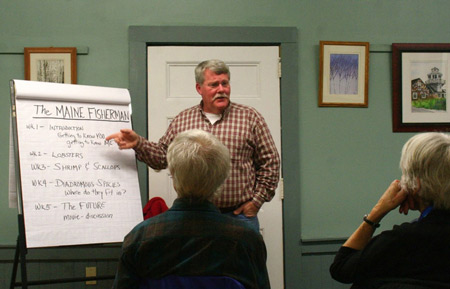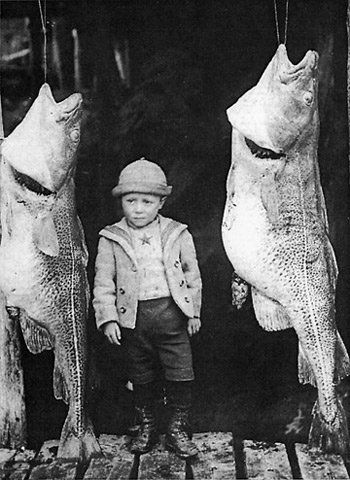Fishery Regulators Deal with
People’s Lives
by Laurie Schreiber

Former state senator Dennis Damon offered a five-session course on “The Maine Fishermen” in Southwest Harbor.
Laurie Schreiber Photo
When Dennis Damon was a teenager, he would head out in his little boat, eastward of Baker Island, to go handlining for codfish.
“One hook, one line, one person, one fish. That’s your effort, and you can do it as many times as you feel capable of doing it. And hopefully a fish will take that hook,” Damon said during a recent discussion of the evolution of fishing practices.
Today, he said, commercial fishing vessels come in sizes that range up to 300 feet long or more, are equipped with sophisticated fish-finding electronics, and are capable of harvesting huge quantities of fish.
“When you have something that huge, how do we think we could possibly be so efficient as to catch that many fish and still have fish for our future?” Damon said.
Damon, who lives in Trenton, is a former state senate chairman of the Legislature’s Marine Resources Committee and was one of Maine’s three commissioners to the Atlantic States Marine Fisheries Commission in Washington, D.C.
Damon’s remarks came during a series he offered in Southwest Harbor for people not familiar with the fisheries. The series was called "The Maine Fisherman,” and it covered topics such as the progression over time of the fishing mindset: the development of various types of fishing gear and fishing methods, conservation and the environment and what they meant to the future of the fishery and fishermen, and the many regulations proposed or now in place.
For his lay listeners, Damon provided a cogent discussion of management terms such as catch per unit of effort (CPUE), total allowable catch and maximum sustainable yield—all within the engaging frameworks of real-life stories and his experience in the world of fishery regulation.
Damon said that, in his youth, a fisherman could handline an average of 700 or 800 pounds of groundfish—mostly cod and a little bit of haddock, hake and cusk.
He referenced the fishery management term “catch per unit of effort.”
“That’s an important piece,” he said. For his youthful handline, he said, CPUE was one person, one line, one hook. “The maximum result you can get from that effort is one fish,” he said. “So that’s how I was doing it.”
Another important point, he said, was the size of the cod at the time.
“I have a picture of me holding up a fish that’s probably 40 pounds,” he said, holding his arms wide apart to show the length of the fish as well. “I don’t believe you’ll find a 40-lb. codfish in the Gulf of Maine today. They were not the rule, but they were by no means the exception.”
He pointed out to his audience that, the bigger the fish, the greater its fecundity.
“That’s important because of stock preservation,” he said. “Over the course of time, because there were no regulations, and maybe because new technologies came into play, we continued to harvest those big fish and the stock collapsed.”

Damon said that old-time tales about codfish might conjure images of masses of fish so dense that a person could walk across their backs in the water.
“I don’t know about that part,” he said. “But I do know, just in my lifetime, that the abundance of codfish and groundfish in general was far greater than it is now.”
For the lobster fishery, he said, minimum and maximum size requirements have been two essential pieces in its regulation.
“Dad told me this when I was first fishing with him,” he said. “We picked this great, big lobster up and he said, ‘This is your future. We can’t keep this lobster. This is your future.’ ‘What do you mean?’ ‘It is that lobster that’s going to make all the babies for you to fish, so we’re going to put her back.’ ‘All right, sounds good to me.’ I never questioned it.”
Yet, as a Maine representative on the interstate fisheries management group, he said, it has been frustrating to witness the collapse of lobster stocks in other areas that have not had stringent regulations in place.
“There are collapsing stocks in the southern regions,” he said. “Some of it might have to do with conservation practices, some of it might have to do with climate change, some of it might have to do with pollution. There are so many factors that can affect it. But there are only so many that we can control, and it’s the ones that we can control that I think we should.”
As a former legislator, he said, he was constantly made aware of the pain to fishing communities that was caused by regulations. Yet, he said, he remained convinced that regulations, based on sound science, are necessary.
“I was oftentimes approached by people saying, ‘You’re taking food off my table. I need to feed my kids. I need to work,’” he said. “I know that. In my family, we’ve eaten fish more than I’ve wanted to at times. So I know it. But the question I’ve asked them is, ‘What are you going to do when there are no more urchins, when there are no more scallops, when there are no more groundfish? What are you going to do then?’ And they’re either going to say, ‘Well, that’s never going to happen, we’re not fishing it to extinction,’ with which I would disagree. Or they’re going to say, ‘I’ll find something else to do.’ And if that’s their answer, then my answer to them is, ‘You need to start helping yourself find something to do now. I’m not doing this to take food out of your kids’ mouths. I’m doing this so that your kids will have the opportunity to do what you’re doing.’”
At this point, he said, he remained concerned about the status of fish stocks. “I won’t allow myself to be fatalistic and say it’s over with, but I will tell you that we need regulations,” he said. “But there are those who would say, ‘No. No, I can still get them. All I have to do is work a little harder.’”
One listener said fishery management must be as difficult as predicting the weather. “The best line that I have ever heard with regard to fishery management was, ‘Listen, fisheries management isn’t rocket science—it’s harder,’” Damon said. “And it’s harder in the respect that you’re dealing with people’s lives.”
